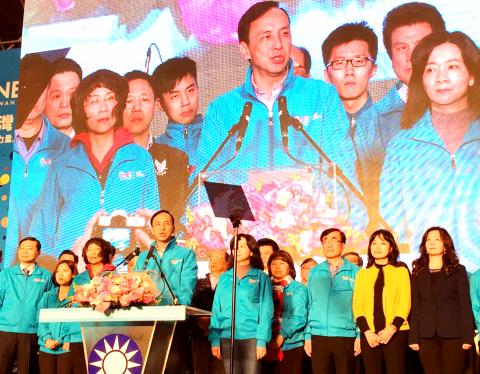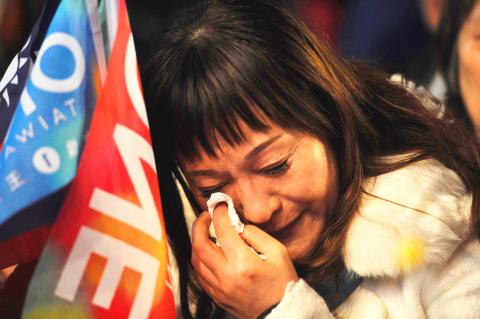The Chinese Nationalist Party (KMT) yesterday lost the presidential election to the Democratic Progressive Party (DPP) by the second-biggest margin since the nation held its first direct presidential election in 1996, shattering KMT presidential candidate Eric Chu’s (朱立倫) dream of keeping the party in power.
Chu, who had sought to win the presidency by branding himself as the nation’s sole choice for cross-strait peace and stability, garnered 31.04 percent of the total vote, while his primary challenger, DPP candidate Tsai Ing-wen (蔡英文), received 56.12 percent.
According to Central Election Commission data, Tsai won 6.89 million votes, leading Chu — who received 3.81 million votes — by 3.08 million votes.

Photo: CNA
The highest winning margin was recorded in the nation’s first direct presidential election in 1996, when the KMT’s candidate, President Lee Teng-hui (李登輝), beat his DPP challenger, Peng Ming-min (彭明敏), by about 3.5 million votes.
In the 2008 presidential race, the KMT’s Ma Ying-jeou (馬英九) crushed former premier Frank Hsieh (謝長廷) of the DPP by approximately 2.2 million votes.
In his concession speech delivered at 7pm, Chu first apologized to his supporters for failing to live up to their expectations and for “failing to fulfill the KMT’s obligation to safeguard the Republic of China” (ROC), before bowing for five seconds.

Photo: CNA
“As both the chairman and presidential candidate of the KMT, I cannot shrink from my responsibility and must shoulder the blame. Dear friends, I have failed you. I will immediately resign from my post as KMT chairman,” Chu said.
“No way, we will not allow you [to resign]. The [ROC] national flag must not fall,” his supporters responded.
Extending his congratulations to Tsai on her victory, Chu said he hoped Tsai and the DPP would steer the nation toward a brighter and happier future, to which his supporters shouted: “Impossible.”
Several KMT supporters shed tears as Chu spoke, with some leaving in the middle of his speech because “it is too sad to listen to this.”
However, a number of elderly supporters disrupted Chu’s speech, saying: “How dare you to keep talking after losing.”
Chu then pledged to reflect on the KMT’s defeat and the party’s failure to be in sync with public opinion, while vowing to re-evaluate the party’s policy direction and its selection of personnel.
“While we have lost the election, we still have an obligation to supervise the nation’s future direction and development, the new government and the new ruling party. This is what a responsible opposition party should do,” Chu said.
The loss marks the third time that the KMT has become an opposition party, after 2000’s unprecedented victory by then-DPP presidential candidate Chen Shui-bian (陳水扁) that put an end to the KMT’s nearly six-decade rule. Chen was re-elected in 2004.
It also deals a new blow to the KMT, whose disastrous defeat in the 2014 nine-in-one elections forced Ma to step down as KMT chairman.
A dismal atmosphere had been looming over the KMT’s headquarters in Taipei since the polls closed at 4pm.
Only a handful of supporters arrived at the headquarters for an open-air rally and to watch a live video feed of the ballots being counted about an hour after the count started. The approximately 250 red plastic stools set up at the rally were not filled until after 6pm.
As Tsai’s lead hit nearly 1.5 million votes at 5:30pm, Chu’s campaign spokesmen, Lee Cheng-hao (李正皓) and Hsu Chiao-hsin (徐巧芯), attempted to lift the spirits of the crowd.
“Let us point our ROC national flags in the direction of Chu’s office and cheer,” Hsu said to the crowd, adding that Chu had arrived at the building at 2pm.
With the gap between Chu and Tsai continuing to widen, KMT spokesman Yang Wei-chung (楊偉中) announced his resignation on Facebook at 6pm, saying he had tendered his oral resignation earlier in the day.
“After tomorrow, let us continue to strive for Taiwan’s freedom, equality and happiness,” Yang wrote.
Former Taipei mayor Hau Lung-bin (郝龍斌) stepped down as a KMT vice chairman after failing to secure a legislative seat in Keelung.

Taiwanese can file complaints with the Tourism Administration to report travel agencies if their activities caused termination of a person’s citizenship, Mainland Affairs Council Minister Chiu Chui-cheng (邱垂正) said yesterday, after a podcaster highlighted a case in which a person’s citizenship was canceled for receiving a single-use Chinese passport to enter Russia. The council is aware of incidents in which people who signed up through Chinese travel agencies for tours of Russia were told they could obtain Russian visas and fast-track border clearance, Chiu told reporters on the sidelines of an event in Taipei. However, the travel agencies actually applied

Japanese footwear brand Onitsuka Tiger today issued a public apology and said it has suspended an employee amid allegations that the staff member discriminated against a Vietnamese customer at its Taipei 101 store. Posting on the social media platform Threads yesterday, a user said that an employee at the store said that “those shoes are very expensive” when her friend, who is a migrant worker from Vietnam, asked for assistance. The employee then ignored her until she asked again, to which she replied: "We don't have a size 37." The post had amassed nearly 26,000 likes and 916 comments as of this

New measures aimed at making Taiwan more attractive to foreign professionals came into effect this month, the National Development Council said yesterday. Among the changes, international students at Taiwanese universities would be able to work in Taiwan without a work permit in the two years after they graduate, explainer materials provided by the council said. In addition, foreign nationals who graduated from one of the world’s top 200 universities within the past five years can also apply for a two-year open work permit. Previously, those graduates would have needed to apply for a work permit using point-based criteria or have a Taiwanese company

The Shilin District Prosecutors’ Office yesterday indicted two Taiwanese and issued a wanted notice for Pete Liu (劉作虎), founder of Shenzhen-based smartphone manufacturer OnePlus Technology Co (萬普拉斯科技), for allegedly contravening the Act Governing Relations Between the People of the Taiwan Area and the Mainland Area (臺灣地區與大陸地區人民關係條例) by poaching 70 engineers in Taiwan. Liu allegedly traveled to Taiwan at the end of 2014 and met with a Taiwanese man surnamed Lin (林) to discuss establishing a mobile software research and development (R&D) team in Taiwan, prosecutors said. Without approval from the government, Lin, following Liu’s instructions, recruited more than 70 software